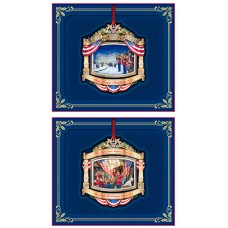The White House Historical Christmas Ornament William McKinley - 2010
Availability: In Stock
Add to Compare
We are pleased to bring you one of our personal favorites, the White House Historical Society's annual White House Christmas ornament. We think the 2010 ornament is simply spectacular.
These make the best gifts not only for family and friends,but for business associates and your own family as well. Start the tradition, and have a look at the wildly popular issues of years gone by.
They are simply beautiful and each one tells a historical story, adding such significance to their beauty. Make the White House Historical Society Christmas Ornaments a part of your family's tradition!
---------
The 2010 ornament celebrates the administration of President William McKinley (1897-1901) and music performed in the White House. It features and Army Navy reception and the music of the Marine Corps Band.
Presidential Background:
The subject of the ornament this year is William McKinley. Our 25th President, he was the last veteran of the Civil War to be elected to office.
An astute lawyer and politician, he won office by using a unique plan to seek donations from big business. Trailing in polls as late as August of 1896, he was elected in a landslide by November of that year.
He was progressive and initiated many economic, military and civil rights campaigns. He implemented the gold standard, provided prosperity, and launched the Spanish American War. He annexed the Philippines, Guam and Puerto Rico as a result, made Cuba a protectorate of the US, and separately annexed the kingdom of Hawaii as a territory.
Popular with the voters, he was reelected to a second term in 1900. Shortly into his second term, McKinley was assassinated in New York State.
The Ornament Subject Matter:
The 2010 ornament focuses on Music, the Military and McKinley.
As a former Civil War Union officer, he had a soft spot in his heart for the military. He was a proud and patriotic citizen who reveled in the thoughts of a strong army. He hosted the 1900 Army-Navy Reception to show his appreciation for their dedication to country, honor and duty. The piece tells a story of that event.
The front of the ornament depicts the Marine band playing outside as the guests arrive for an evening of entertainment at the White House. The back of the ornament depicts the Marine band playing in the East Room where officers and their ladies sat side by side with President and Mrs. McKinley.
White House Collectible Ornament Collection
The White House Historical Association
...........................................
Our 25th President
William McKinley At the 1896 Republican Convention, in time of depression, the wealthy Cleveland businessman Marcus Alonzo Hanna ensured the nomination of his friend William McKinley as "the advance agent of prosperity." The Democrats, advocating the "free and unlimited coinage of both silver and gold"--which would have mildly inflated the currency--nominated William Jennings Bryan.
While Hanna used large contributions from eastern Republicans frightened by Bryan's views on silver, McKinley met delegations on his front porch in Canton, Ohio. He won by the largest majority of popular votes since 1872.
Born in Niles, Ohio, in 1843, McKinley briefly attended Allegheny College, and was teaching in a country school when the Civil War broke out. Enlisting as a private in the Union Army, he was mustered out at the end of the war as a brevet major of volunteers. He studied law, opened an office in Canton, Ohio, and married Ida Saxton, daughter of a local banker.
At 34, McKinley won a seat in Congress. His attractive personality, exemplary character, and quick intelligence enabled him to rise rapidly. He was appointed to the powerful Ways and Means Committee.
Robert M. La Follette, Sr., who served with him, recalled that he generally "represented the newer view," and "on the great new questions was generally on the side of the public and against private interests."
During his 14 years in the House, he became the leading Republican tariff expert, giving his name to the measure enacted in 1890. The next year he was elected Governor of Ohio, serving two terms.
When McKinley became President, the depression of 1893 had almost run its course and with it the extreme agitation over silver. Deferring action on the money question, he called Congress into special session to enact the highest tariff in history.
In the friendly atmosphere of the McKinley Administration, industrial combinations developed at an unprecedented pace.
Newspapers caricatured McKinley as a little boy led around by "Nursie" Hanna, the representative of the trusts. However, McKinley was not dominated by Hanna; he condemned the trusts as "dangerous conspiracies against the public good."
Not prosperity, but foreign policy, dominated McKinley's Administration. Reporting the stalemate between Spanish forces and revolutionaries in Cuba, newspapers screamed that a quarter of the population was dead and the rest suffering acutely. Public indignation brought pressure upon the President for war.
Unable to restrain Congress or the American people, McKinley delivered his message of neutral intervention in April 1898. Congress thereupon voted three resolutions tantamount to a declaration of war for the liberation and independence of Cuba. In the 100-day war, the United States destroyed the Spanish fleet outside Santiago harbor in Cuba, seized Manila in the Philippines, and occupied Puerto Rico.
"Uncle Joe" Cannon, later Speaker of the House, once said that McKinley kept his ear so close to the ground that it was full of grasshoppers.
When McKinley was undecided what to do about Spanish possessions other than Cuba, he toured the country and detected an imperialist sentiment. Thus the United States annexed the Philippines, Guam, and Puerto Rico.
In 1900, McKinley again campaigned against Bryan. While Bryan inveighed against imperialism, McKinley quietly stood for "the full dinner pail."
His second term, which had begun auspiciously, came to a tragic end in September 1901. He was standing in a receiving line at the Buffalo Pan-American Exposition when a deranged anarchist shot him twice. He died eight days later.
Write a review
Your Name:Your Review: Note: HTML is not translated!
Rating: Bad Good
Enter the code in the box below:





